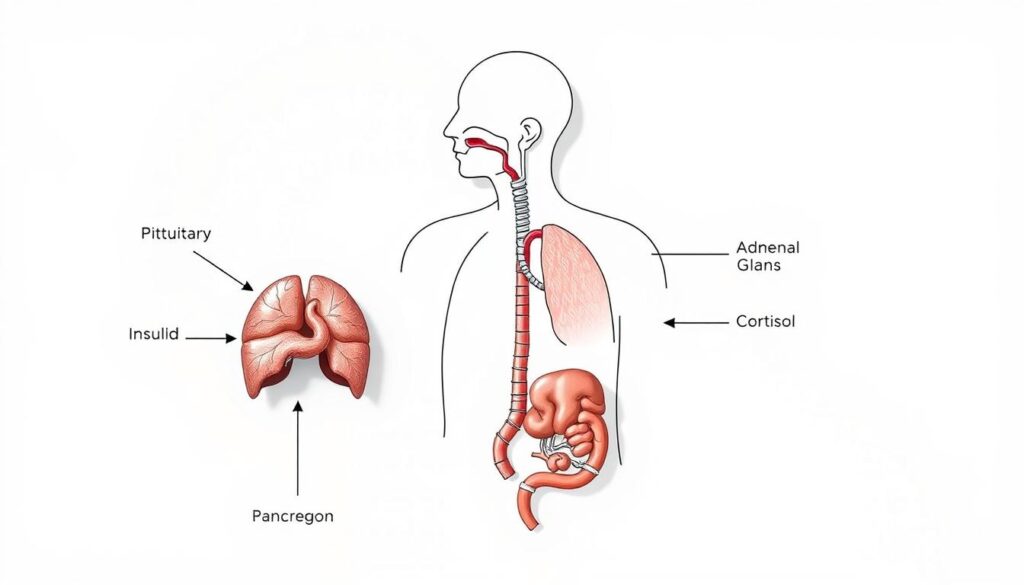Did you know that nearly 40% of adults in the United States have tried some form of intermittent fasting? This eating pattern involves periods of fasting followed by regular eating, potentially leading to significant weight loss and improved metabolic health.
Intermittent fasting represents a shift in our approach to nutrition, focusing on when we eat rather than just what we eat. By restricting food intake for certain periods, individuals may experience improvements in their body’s metabolic processes.
This comprehensive guide will explore the effects of fasting on hormonal balance, fat burning, and overall health, providing insights into how this eating pattern can be tailored to individual weight management goals and lifestyles.
Understanding Intermittent Fasting
Unlike traditional diets that specify what to eat, intermittent fasting emphasizes when to eat. This approach to dietary management focuses on the timing of meals rather than their content, offering a unique perspective on health and nutrition.
What Is Intermittent Fasting?
Intermittent fasting involves alternating periods of eating and fasting in order to promote weight loss, improve metabolic health, and extend lifespan. It’s not about which foods to eat, but rather when you should eat them.
The Science Behind Fasting
The human body is adapted to survive for periods without food, and fasting can trigger various cellular processes that help protect against disease. During fasting, the body shifts from relying on glucose for energy to relying on stored fat, potentially leading to weight loss and improved metabolic health.
Popular Intermittent Fasting Methods
There are several methods of intermittent fasting, each with its own schedule and benefits.
16/8 Method
This involves fasting for 16 hours and eating within an 8-hour window. It’s one of the most accessible methods for beginners.
5:2 Approach
With this method, you eat normally for five days of the week and restrict your calorie intake to 500-600 calories on the other two days.
Alternate Day Fasting
This involves fasting every other day, which can be more challenging but may offer significant metabolic benefits.
| Method | Description | Potential Benefits |
|---|---|---|
| 16/8 | Fast for 16 hours, eat within 8 hours | Weight loss, improved insulin sensitivity |
| 5:2 | Eat normally for 5 days, restrict calories for 2 days | Weight loss, reduced inflammation |
| Alternate Day | Fast every other day | Significant weight loss, improved metabolic health |

Each of these methods has its own advantages and can be chosen based on individual preferences and health goals. By understanding the different approaches to intermittent fasting, individuals can make informed decisions about their dietary habits.
How Fasting and Metabolic Health Are Connected
The connection between fasting and metabolic health is rooted in a complex physiological process. When we fast, our bodies undergo a series of adaptations that impact our metabolic health. One key aspect of this adaptation is the concept of metabolic switching.
The Metabolic Switch Explained
Metabolic switching occurs when the body transitions from relying on glucose as its primary fuel source to burning stored fat. This switch typically happens after 10-12 hours of fasting, when liver glycogen stores are depleted.

Fat Burning vs. Sugar Burning
During fasting, the body initially uses stored glucose for energy. Once glucose is depleted, it begins to break down fat into ketone bodies, which serve as an alternative energy source. This transition from sugar burning to fat burning is crucial for improving metabolic health.
Metabolic Adaptation During Fasting
The cyclical nature of intermittent fasting optimizes metabolic flexibility, allowing the body to adapt to different fuel sources. Research suggests that this adaptation may improve insulin sensitivity, reduce inflammation, and enhance cellular stress resistance.
| Metabolic State | Primary Fuel Source | Key Adaptations |
|---|---|---|
| Fed State | Glucose | Insulin release, glucose storage |
| Fasted State | Fat | Ketone body production, improved insulin sensitivity |
By understanding how fasting influences metabolic health, individuals can harness the benefits of metabolic switching to improve their overall well-being.
Hormonal Changes During Intermittent Fasting
Intermittent fasting triggers a cascade of hormonal responses that influence metabolic function. When you adopt intermittent fasting, your body undergoes various hormonal shifts that collectively create an optimal environment for metabolic health improvements.
Insulin Response and Sensitivity
Insulin is one of the main hormones involved in fat metabolism. It tells your body to store fat and stops your body from breaking fat down. Having chronically high levels of insulin can make it much harder to lose weight. Intermittent fasting has been shown to be just as effective as calorie-restricted diets for lowering your insulin levels. In fact, this eating style could reduce fasting insulin levels by 20-31%. Lower insulin levels allow the body to more effectively access and utilize stored fat for energy, facilitating weight loss and improved metabolic function.
Human Growth Hormone Increases
Fasting can cause a rise in blood levels of human growth hormone, an important hormone for promoting fat loss. Some studies have shown that in men, levels of human growth hormone may increase by as much as fivefold while fasting. This significant increase helps preserve muscle mass while promoting fat loss.
Norepinephrine and Fat Burning
Norepinephrine, a stress hormone that improves alertness and attention, is involved in the “fight or flight” response. It has a variety of other effects on your body, one of which is telling your body’s fat cells to release fatty acids. Increases in norepinephrine generally lead to larger amounts of fat being available for your body to burn. Fasting leads to a rise in the amount of norepinephrine in your bloodstream.
| Hormone | Effect During Fasting | Benefit |
|---|---|---|
| Insulin | Levels decrease by 20-31% | Improved insulin sensitivity, reduced insulin resistance |
| Human Growth Hormone (HGH) | Levels increase up to fivefold in men | Preserves muscle mass, promotes fat loss |
| Norepinephrine | Levels increase | Enhances fat burning, improves alertness |

The hormonal shifts during intermittent fasting work synergistically to create a metabolic environment that favors fat utilization while preserving lean tissue. Women may experience different hormonal responses to fasting than men, with potentially less pronounced HGH increases, highlighting the importance of gender-specific considerations.
Weight Management Benefits of Intermittent Fasting
Intermittent fasting has emerged as a highly effective strategy for weight management. By incorporating periods of fasting into one’s lifestyle, individuals can experience significant benefits in terms of weight loss and overall metabolic health.
Effectiveness for Weight Loss
Studies have shown that intermittent fasting can be as effective as, if not more effective than, traditional calorie restriction for weight loss. A 2014 review highlighted that intermittent fasting resulted in a 3-8% body weight loss over 3-24 weeks. This method not only aids in weight loss but also helps in maintaining a healthy metabolism.

Preserving Muscle Mass While Losing Fat
One of the significant advantages of intermittent fasting is its potential to preserve muscle mass while primarily targeting fat loss. The increase in human growth hormone during fasting periods is attributed to this preservation of lean muscle tissue, which is crucial for maintaining a healthy metabolism.
Preventing Metabolic Slowdown
Unlike traditional dieting, which often leads to adaptive thermogenesis and a reduced metabolic rate, intermittent fasting may help prevent this metabolic adaptation. By maintaining higher metabolic rates even during weight loss phases, intermittent fasting supports continued weight loss and overall metabolic health.
| Method | Weight Loss | Muscle Preservation | Metabolic Rate |
|---|---|---|---|
| Intermittent Fasting | 3-8% body weight | Effective | Maintained |
| Calorie Restriction | Variable | Less Effective | Reduced |
Beyond Weight Loss: Other Health Benefits
Intermittent fasting is associated with a range of benefits that can enhance overall well-being. Research has shown that this practice can have a significant impact on various aspects of health, from cardiovascular well-being to cognitive function.
Improved Heart Health Markers
Studies have demonstrated that intermittent fasting can lead to improvements in heart health markers. These include reduced blood pressure, lower resting heart rates, and decreased LDL cholesterol levels. Such changes contribute to a reduced risk of heart disease.

Brain Function and Cognitive Benefits
Intermittent fasting has also been linked to enhanced cognitive function. Research has shown that it can improve working memory and verbal recall. Additionally, it may reduce the risk of neurodegenerative disorders, potentially leading to a sharper mind as we age.
Potential for Disease Prevention
The practice of intermittent fasting may offer protection against various chronic diseases. Specifically, it has shown promise in managing and potentially preventing type 2 diabetes and inflammatory conditions.
Type2 Diabetes
For individuals with type 2 diabetes, intermittent fasting can help improve insulin sensitivity and reduce fasting glucose levels. This can lead to better disease management and potentially decrease the need for medication.
Inflammatory Conditions
Intermittent fasting has anti-inflammatory effects, which can help address various inflammatory conditions. By reducing inflammatory markers and oxidative stress, it may provide relief for conditions characterized by chronic inflammation.
Key benefits of intermittent fasting include its ability to affect multiple biological systems positively. It can improve cardiovascular health, enhance cognitive function, and potentially reduce the risk of chronic diseases like type 2 diabetes and certain inflammatory conditions.
- Cardiovascular health improvements have been documented, including reduced blood pressure and lower resting heart rates.
- Cognitive function appears to benefit, with enhanced working memory and verbal recall.
- The practice shows promise in managing type 2 diabetes by improving insulin sensitivity.
Getting Started with Intermittent Fasting Safely
Before diving into intermittent fasting, it’s crucial to understand how to start safely. This involves several key considerations to ensure a successful and healthy experience.
Choosing the Right Fasting Protocol
Selecting the appropriate fasting protocol is vital for success. Beginners often find the 16/8 method, which involves fasting for 16 hours and eating within an 8-hour window, to be the most sustainable. More experienced individuals might explore other methods like the 5:2 diet or alternate-day fasting.

What to Eat During Eating Windows
The quality of food consumed during eating periods significantly impacts the effectiveness of intermittent fasting. Focusing on nutrient-dense whole foods, such as vegetables, fruits, lean proteins, and whole grains, is recommended. The Mediterranean diet is often cited as a good blueprint for healthy eating, whether or not you’re practicing intermittent fasting.
Common Challenges and How to Overcome Them
Common challenges when starting intermittent fasting include hunger, irritability, and fatigue during the initial adaptation period, which typically lasts 2-4 weeks. Staying hydrated with water, black coffee, or unsweetened tea during fasting periods can help manage hunger and maintain energy levels.
Who Should Avoid Intermittent Fasting
Certain populations should avoid intermittent fasting entirely, including children and adolescents under 18, pregnant or breastfeeding women, people with type 1 diabetes, and those with a history of eating disorders. For individuals with type 2 diabetes or other chronic conditions, medical supervision is essential when implementing intermittent fasting.
Conclusion: Is Intermittent Fasting Right for You?
Intermittent fasting is increasingly recognized for its flexibility and effectiveness in improving health outcomes. This approach to eating can be tailored to individual preferences, lifestyles, and health goals, making it a potentially sustainable long-term strategy.
Research Supporting Intermittent Fasting
The growing body of research on intermittent fasting has demonstrated its benefits for weight management, insulin sensitivity, and various health markers. However, individual responses to intermittent fasting can vary based on factors such as age, gender, and baseline health status.
Consider Your Health Goals and Lifestyle
When deciding if intermittent fasting is right for you, consider your personal health history, current medications, lifestyle demands, and health goals. Ultimately, the best dietary approach is one that you can maintain consistently over time. By making informed decisions based on scientific evidence and personal circumstances, you can take control of your health journey.
